The Wishi Project
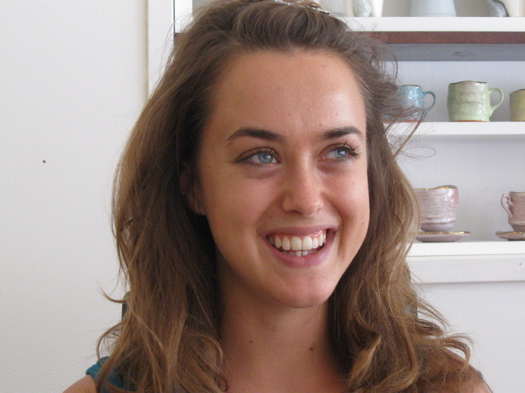
Wishi Project founder, Elizabeth Gray
When Elizabeth Gray went to UAlbany to get a Masters in philosophy, people asked the usual question: "What are you going to do with a philosophy degree?" (You know you thought it.)
And Elizabeth didn't really know, herself.
But what she's doing now was certainly not on the list.
Gray finished her thesis in January and set out for Ecuador with no plan. At all. A few weeks later she was living in the rain forest with a tribe of indigenous people in the Wishicommunity. Fast forward a few more weeks and she was making a plan to build a school for their children.
The plan became The Wishi Project, and she's come back to Albany to make it work.
Why Albany? Elizabeth's answer to that and other questions -- plus some fantastic pictures from her trip, after the jump.
So how did you get involved with the Wishi?
Back in January I was finishing my thesis and and my job was ending -- everything was coming to a close. So I decided to just go somewhere. I went to Ecuador.
I just wanted to go there. I didn't know anyone there and I had no plan, except a one week hostel reservation. After a week or so a friend of a friend of a friend took me and some of the folks I'd met in the hostel to the rain forest to do some reforestation. He was an indigenous guy -- Shuar, they are called. Basically we took the bigger seeds from the middle of the forest to the outside. Monkeys used to bring the seeds out, but they don't make it to the edge of the forest that much anymore.
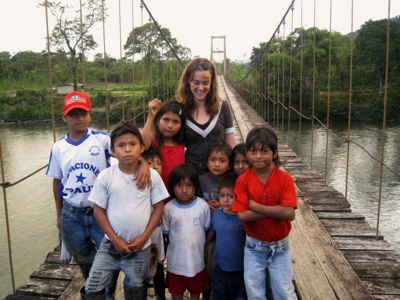
We met more Shuar -- the Wishi -- in the rain forest, and they asked us if we'd teach their kids in the afternoon. Most of the kids have never been to school at all, so they don't know letters, numbers, colors. They had this old scrap of aluminum roofing they set up for a makeshift school and they had a tree stump for a desk. We ended up painting rocks with paint made from seeds, and these kids were soooo happy to be learning! It was incredible. They were sitting there painting numbers on rocks, running their fingers over the numbers.
The family asked if we could stay for the whole week. We didn't have enough food -- we'd only planned to be there for a day. So now we're really living with them -- doing our laundry and drinking from the river and bathing in the river and eating what they can find in the forest -- fish soup for breakfast -- stuff like that. We'd do reforestation work in the morning and teach classes in the afternoon.
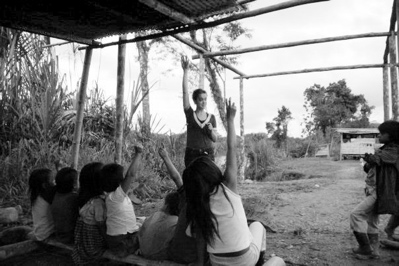
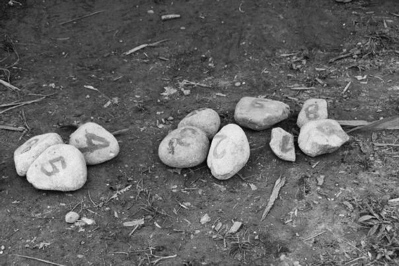
They learned numbers and letters and had art class. We set up a still life with some flowers from the rain forest and a plastic mug and the kids drew with charcoal we got from the fire and this paint we made from seeds and made these absolutely beautiful paintings.
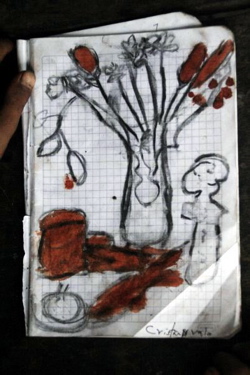
How did you go from teaching for a week to building a school?
I left to do some work in the Galapagos, but I came back to visit with the Wishi. They told me they'd been trying to set up a school there but there's a lot of racism when it comes to the indigenous people. The government keeps promising them money for a school but it never appears. All they'd need would be $5,000 to build the school building. Then it will be about another two or three thousand for a chalkboard and supplies. And for teachers we're thinking about $200 a month. I'm working with the local government to try to find a way to provide money to keep paying teachers.
They're doing this themselves, I'm just helping. I want it to be something they can have pride and ownership in, not something someone came in and did for them. For example, we asked if they'd want to use their own wood for the school or buy it from the store. They said, "Well, we want it to be the prettiest school in the world so we want to use our wood." That's going to be harder to do, but that's a point of pride for them.
The total cost will be around $12- or $13-thousand. That just seemed so doable. Some of the family have left and gone to the nearest city just so that their kids can go to school. Life in the rain forest isn't easy -- no electricity or running water -- but it's a good life. I visited a sister in the city. She and her two kids were living in a 10x12 room with one bed, a camping stove and an awful shared bathroom. Some of them might come back to the forest if there was a school.
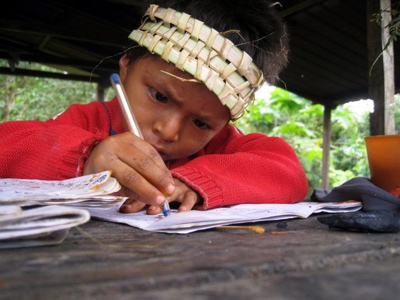
If the kids get an education, do you think they'll want to stay in the rain forest? Can't a school challenge their way of life?
Well that was one of the things I had to think about. The impact on the community. I spent a lot of time thinking about the moral implications of it. But whether they have a school or not, they are going to have to interface with the modern world -- they're going to have a challenge from the outside world that could jeopardize their community. Education will give these kids the tools they need to protect their land and maintain their culture.
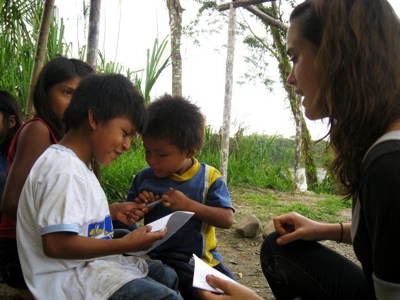
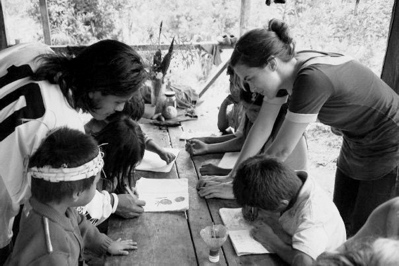
You're from Ithaca via the Bronx, so why come back to Albany to make all this happen?
You know, when I left Albany I didn't expect to come back. But when I came home to Ithaca, I'd talk to people about what I was doing in Ecuador they were nice and supportive, but I knew I had built a community here in Albany that was invigorating and so I came back. And sooo many people here have offered to help. I feel like I can put an energy out into my community and say "This is what I'm trying to make happen," and the community will come back with the answers.
Everybody here that I mention it to says, "What can I do to help?" If they're a business owner they offer to donate something. If they own a music venue they offer to hold a fundraiser. My friend Tommy Watkins is an artist and he offered to design the logo for our website. Another friend introduced me to someone in Albany who runs the Eden Rose Foundation that does work in Ecuador -- mostly basic needs in really super-troubled areas. They provide food and water and safety from abduction, but I've had my whole world change since talking to him. His perspective and insight into the practical process and theoretical issues was fantastic.
Karen at the Albany Art Room was also great. We're doing a camp for kids to raise awareness -- the idea will be to mimic some of the experiences we had in the rain forest. We're going into the park to make jewelery or masks. They'll do Shuar style art and projects that come from a lack of resources. In the rain forest, the kids make toys out of anything they can find -- so if you have an old motor oil bottle and you cut it in half and fill it with stones and add some string, you've got a little car you can pull around. The kids will make art and toys from things they find in the park. On 1st Friday in November we're going to do an art show at the Albany Art Room -- a fund raiser where the kids display what they created. I'm also going to send back some of the art the Wishi kids made in the rain forest.
Why this? There are so many people who need so much help in the world -- why this one small group?
That's a very good question. Greg from Eden Rose said to me, "If I feed all the hungry people in the world, next year there will be twice as many hungry people. All you can do is help the people in your path." So that's what I do. Whether that's the person on Lark Street who needs a dollar for a cup of coffee or the Wishi. Also, I look at this less as a social mission and more a way of doing something for a family who took me in and treated me well.
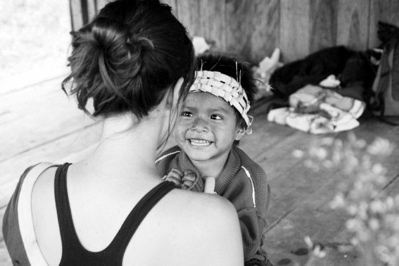
And once you've met these kids -- there may only be 30 kids, but they are 30 kids who want to learn so much. Having met each of them, it's easier for me to guage the effect this will have. They're fighting over one candle at night so they can practice their letters. The second day we were there we found one notebook and we tore it up and sewed together little notebooks with scraps of nylon that we rolled into thread . We made these completely bootleg workbooks, and the kids were like, "These are ours? To keep?" They love to learn. If there is a curious mind, it should be directed in the way it wants to be directed.
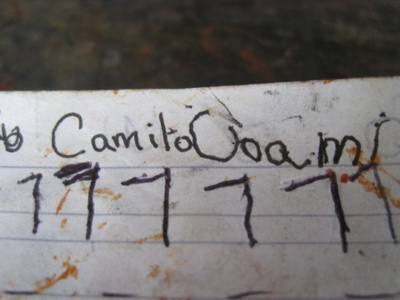
Lots of people think about dropping everything and flying off to another country or doing something big to help people -- what makes you the kind of person who can do it?
You know, when I told people I was going to study philosophy, every single time people would say, "What are you going to do with a philosophy degree?" And I didn't really know. But I guess I've always lived by the idea that if I do what I want to be doing when I'm doing it, I'll end up where I want to be. If you try to plan it all out "here's what i want to be in like ten years," it might actually change and you'll end up someplace where you're not happy.
You can find more photos, and info about the Wishi and how you can help at Wishi.org.
This interview has been edited and condensed.
Photos: Jon Poulter, Chris McMahon and Kaitilin Lowdon
Hi there. Comments have been closed for this item. Still have something to say? Contact us.
Comments
Thanks for this story. With all the junk happening in the world once in a while you come across someone like Elizabeth who reinvigorates faith in the species. I like the reference to the Bronx where I was born and lived over half my life.
... said TM on Jul 22, 2010 at 12:02 PM | link
Awesome story. Thanks for posting this, as an aspiring teacher I'd love to get involved with something like this.
... said AB on Jul 22, 2010 at 12:25 PM | link
Fantastic!! Thanks for posting this, it's very inspiring.
... said Summer on Jul 22, 2010 at 1:41 PM | link
Wow. Thanks for sharing this. It warms my heart to read about people like Ms. Gray, she's quite an impressive young lady.
Gorgeous pictures! They really capture the passion and excitement of Ms. Gray and the Wishi children.
... said Jennifer on Jul 22, 2010 at 7:59 PM | link
I'd love to post this on my Facebook page. Is that possible? I'm so happy to be a small part of this incredible venture.
... said Bonnie on Sep 2, 2010 at 1:12 PM | link
Elizabeth, congratulations on a great project! We have something in common. If you have a chance, please contact me.
Theresa
... said Theresa Fellmann on Jan 7, 2011 at 2:11 AM | link